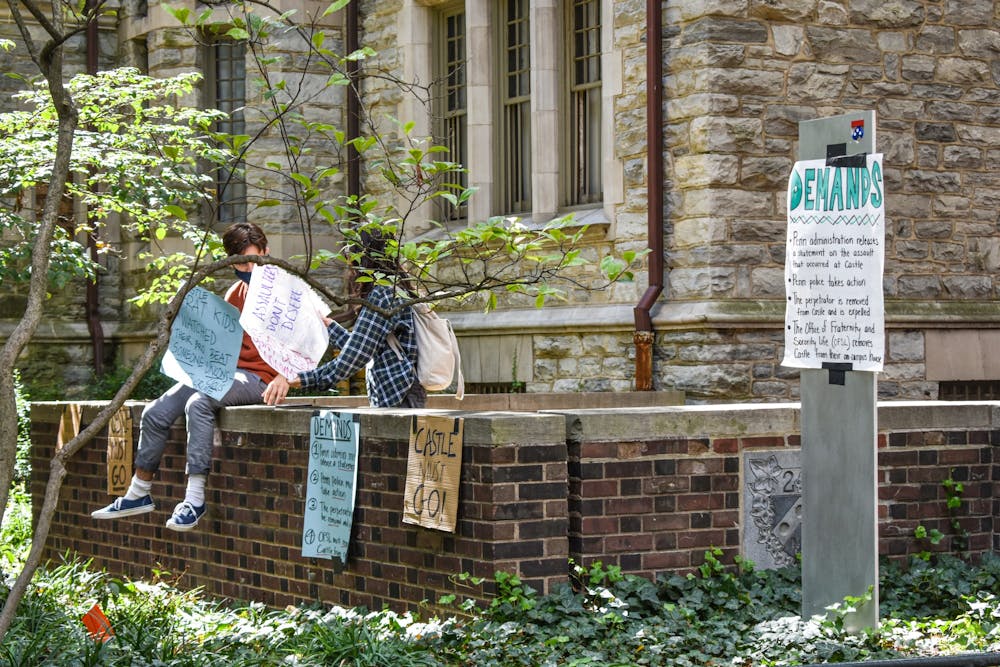
“Work hard, play hard” has grown to become an informal motto for Penn students. The world of play at Penn, however, is far more bourgeois than the basement fraternity parties or tailgates seen in the media. Having a social life is not consistently free, and we do not mean the cost of an overpriced drink at a bar or buying a new outfit to wear out at night. Downtowns are ticketed events, often hosted by fraternities, held at clubs or venues in Philadelphia, which can cost anywhere from $80 to $100 for a ticket directly purchased from the host.
Moreover, resale tickets, which became the primary market for tickets over Spring Fling weekend, were ultimately sold for hundreds of dollars more than sticker price. For events such as Magic Gardens, students shelled out anywhere from $150 to $200, more than double the original price, while certain students purchased Brunch tickets for upwards of $300 or $400. And this is just the tip of the iceberg when it comes to the pure breadth of events students attend during a semester and the associated costs which can quickly rack up to thousands of dollars for some.
These exorbitant resale prices intentionally outstrip the originals when considering the difficulty in obtaining tickets from the original source and the increasing scarcity of tickets the closer to any one of these popular, somewhat exclusive, events. However, it is important to note that even the original prices are lofty and out of reach for many at Penn who are low-income or even middle-class. While fraternities might argue that it’s necessary for them to sell tickets in this way to raise funds, we would push back against the financial exclusivity that is implicit in the current system.
In making prices exceptionally high to attend many of the principal events on packed weekends, fraternities effectively exclude many students who would otherwise attend at a lower price point. Consequently, the social scene at Penn continues to become increasingly economically stratified in a way that in turn disillusions many students with the institutions of Greek life and non-academic life at Penn in general. Thus, the cliquish social sphere is self-perpetuating and entrenched in Penn culture to the extent that such implicitly discriminative events have become normalized.
Additionally, it’s important for fraternities (and sororities alike) to realize that by making these events essentially inaccessible to low-income and middle-class students, they are also in a sense precluding these members of the Penn community from Greek life itself. Implicit in the idea of rushing a fraternity or sorority is an expectation of engagement with their events — not an outsized ask until one considers that these parties often reach triple-digit ticket prices even before resale. Do fraternities view students who fall outside the upper class as being less worthy of their brotherhood? We would argue not necessarily, and if that is true, fraternities must make a commitment to increasing accessibility to their events for all Penn students.
Besides the financial exclusion stemming from Downtowns, continued engagement with fraternities has grown increasingly and more overtly problematic in the wake of discussions on the assault allegations levied against many of them.
After accusations of assault surrounded Castle, an on-campus fraternity, in the fall, conversations about abolishing Greek life and the inherent issues with fraternities were renewed. Students engaged in overt acts of activism by protesting outside of Castle, calling for Penn to take didactic action on the issue. Beyond just the 50 students who protested, there was widespread chatter and general support for the victim of the alleged assault. Countless people took to social media to vocalize outrage at fraternity culture and the University for failing to act against the accused. Conversations among the student body during the fall tended to veer toward outrage at Castle, among other fraternities who have a variety of other allegations. All of this outrage, however, seems to only go so far, abandoned at the slightest inconvenience.
The spring semester at Penn is marked with big events — St. Patrick’s Day and Spring Fling being two notable ones. As a means of celebration, Downtowns are hosted, often by the very fraternities that have come under increased scrutiny by students. But then, in a drastic change of attitude, suddenly bitter competition ensues over ticket drops for events like Magic Gardens or Roar. Many of the same students who passionately denounced Castle and other fraternities for consistently problematic behavior found themselves clamoring to buy tickets for Downtowns. The student body at Penn grows hypocritical when their own social life is at stake.
As the year comes to a close, it will not be long before New Student Orientation and its notorious Downtowns like Pool begin to appear on the horizon once again. While students will always attend, it is nonetheless important to practice what one preaches. Art (in this case the Downtowns) cannot be separated from the artist (the fraternities throwing them). The Penn student body should re-evaluate the Downtown culture and work to remain consistent relative to its activism rather than performative and hypocritical.
Meanwhile, if we remain practical about the probable future of engagement with fraternities (which we do), then, once again, fraternities must make their events accessible to all Penn students. However, this appeal to Greek life is not inconsistent with the equally important entreaty that students continue to bear a burden to hold certain fraternities socially accountable for their actions. To argue the two are mutually exclusive is to assert that all Greek life is inherently problematic, which is far from the point being made; instead, we urge both Greek life and Penn’s student body to interact and work with each other in a way that creates an increasingly open and responsible campus, at all levels.
The Daily Pennsylvanian is an independent, student-run newspaper. Please consider making a donation to support the coverage that shapes the University. Your generosity ensures a future of strong journalism at Penn.
Donate







